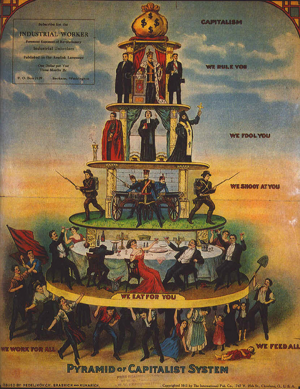Is Capitalism Distorting Christianity?

A 1911 Industrial Worker (IWW newspaper) publication advocating industrial unionism that shows the critique of capitalism. It is based on a flyer of the “Union of Russian Socialists” spread in 1900 and 1901.
Whether we are talking about Occupy Wall Street or unions, capitalistic corporations have often been a target of politicians and pundits attempting to identify what is wrong with the world.
While certainly such people often reduce the complexities of our problems into simplistic diagnosis and solutions instead of getting to the heart of the problem, there can be no doubt that without boundaries, pure capitalism tends to devolve into a means to satisfy the greed of the most powerful at the expense of those lacking power. It is because of that reality that laws were passed against the abuse of such power and unions formed to give the workers a measure of power to counter the company’s.
But I’m not intending to promote or decry capitalism. It has its benefits and negatives, and like any other economic system, is only as benevolent or not as those people in power are or not. Because someone has to be in power, any system will be filled with sinful humans with selfish goals.
As Christian enterprises like music, film, and books have grown over the years, they have become more profitable enterprises.
Many of the traditional Christian publishers are now owned by a handful of non-Christian conglomerates.
Those companies have consolidated most all media—newspapers, publishing companies, cable companies, TV networks, movie companies—into a small elite group.
It is the catch 22 of Christian entertainment. We want the biggest possible audience for our media, to reach the most people with the gospel, but when we start to succeed at that task, the money flows into the bank accounts. Companies are evaluated upon a profit and loss statement rather than the effectiveness of the ministry. Even more so when the head of that Christian media organization has to answer to a non-Christian parent company who has no patience with ministry goals.
Christian authors encounter this dynamic as well.
We want our books to sell well, so our ministry will have the largest impact. For those who find that success, it is easy to look at writing more as a means to obtain money than a ministry, and focus our writing on what will produce the biggest return financially rather than spiritually.
Even for those authors who don’t find that success, the desire for it can become more important than simply writing the story that will glorify God. Coveting needs no fulfillment to hurt us.
Writing and publishing requires treating them like a business if it is to be sustainable.
The challenge for the Christian has always been how to balance the demands of good business decisions with the need of good ministry decisions.
It takes a spiritually mature person in each of these cases to avoid the temptation to allow money to guide their decisions and life. Some people will be guilty of falling into that trap. Good Christian authors will allow capitalistic concerns to trump God’s goals for them.
When we see that happen or sense that it has in a certain case, as a Christian reader we can grow disillusioned. Give up on the task of influencing the world by shinning our little light of Christ in the darkness. Throw in the towel on promoting Christian fiction in whatever venue we have been given. Or as an author, pull into an enclave rather than continue to reach out.
As Jesus said, we are in the world but not of it.
If we keep an eternal perspective, whatever our ministry God has given us, the concerns for paying the bills and whether our book will earn out, will not override touching lives for God and making our lives a testament to His glory.
Has capitalism tainted Christianity? As much as the Fall has, yes. The good news is God can still redeem our efforts, still work though our bad decisions. He still doesn’t give up on us or our stories.
We should not give up on shining the light of Christ in the distorted culture of the world either. We should not let imperfections keep us from using stories to point people to God.
If culture is redeemable, it is because the people that make it up are redeemable.
Culture is, after all, a tool, an expression of who we are as a people. We can let culture influence us, including capitalistic concerns, or we can influence the culture for Christ.
How do you respond to the tug-of-war between Christianity and the world, between the eternal and the temporal in our entertainment decisions?




































